Unit 5 第四课时 Section B(2a-2c) 课件【大单元教学】人教版七年级英语上册Unit 5 Do you have a soccer ball
文档属性
| 名称 | Unit 5 第四课时 Section B(2a-2c) 课件【大单元教学】人教版七年级英语上册Unit 5 Do you have a soccer ball | 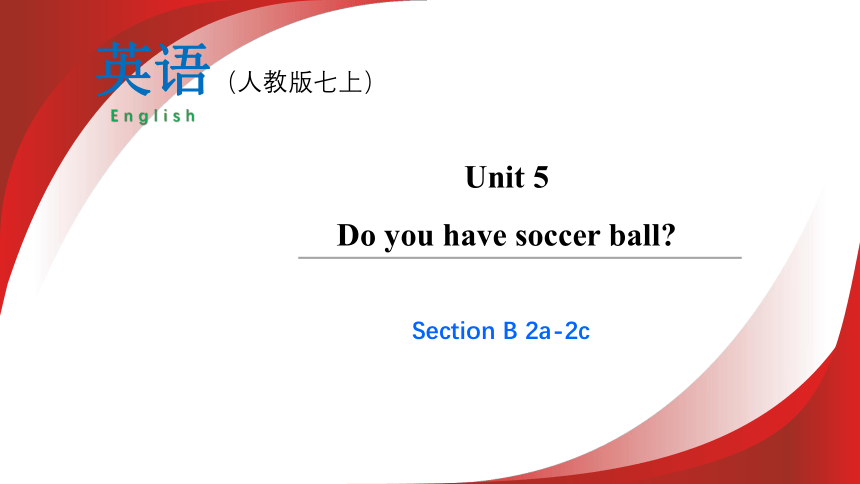 | |
| 格式 | pptx | ||
| 文件大小 | 4.9MB | ||
| 资源类型 | 试卷 | ||
| 版本资源 | 人教新目标(Go for it)版 | ||
| 科目 | 英语 | ||
| 更新时间 | 2023-09-21 13:37:06 | ||
图片预览

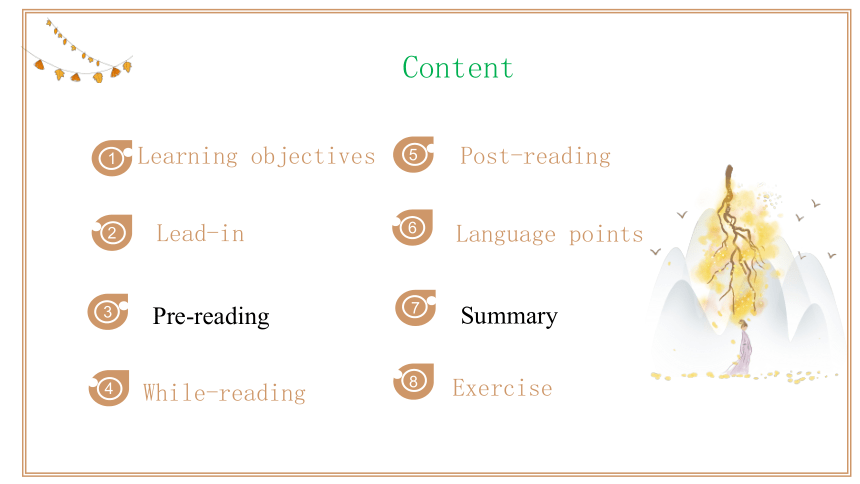
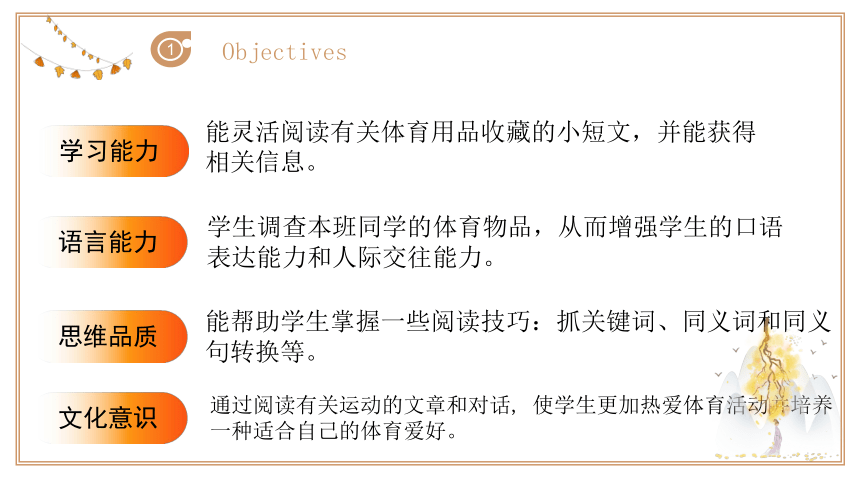
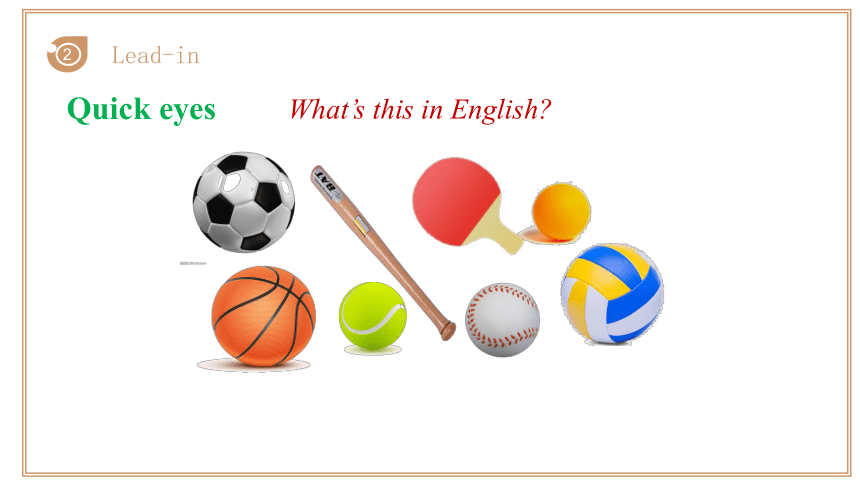

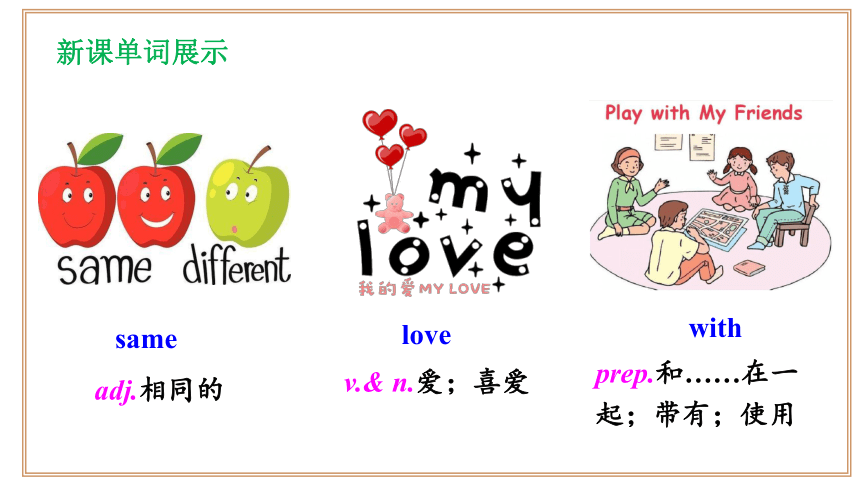
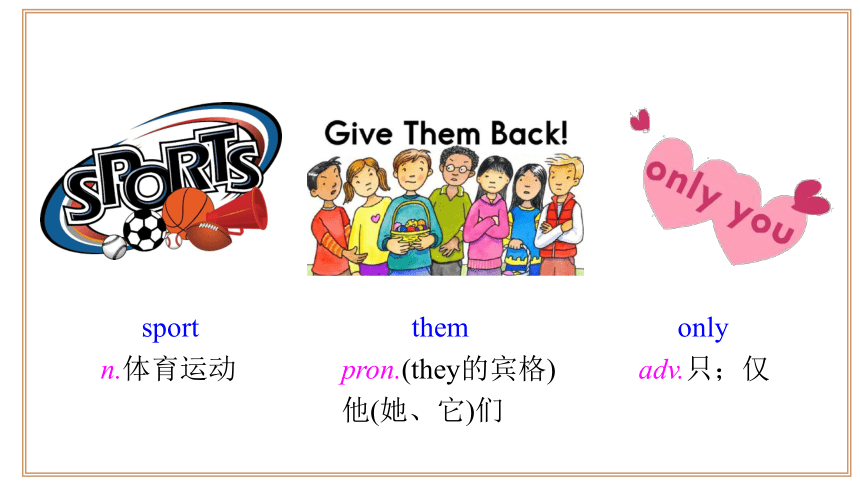
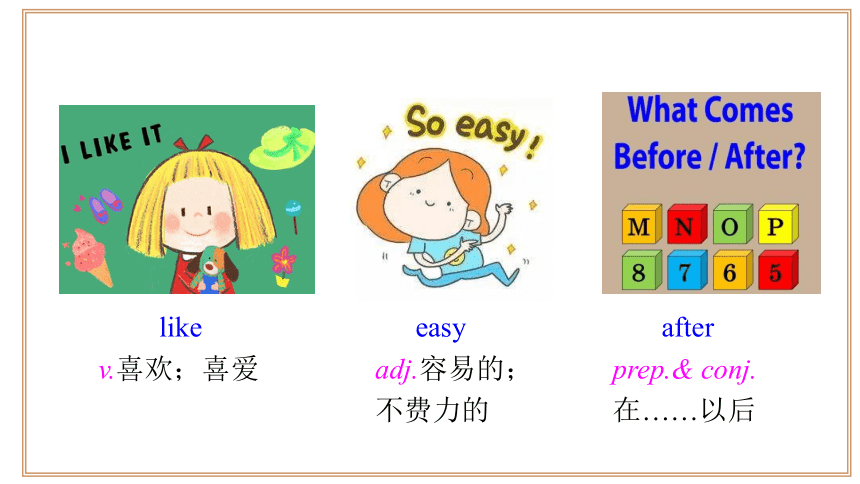
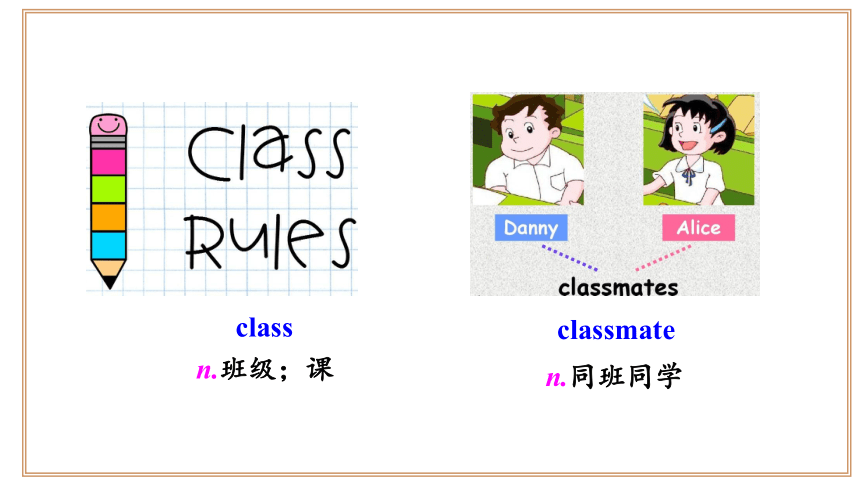
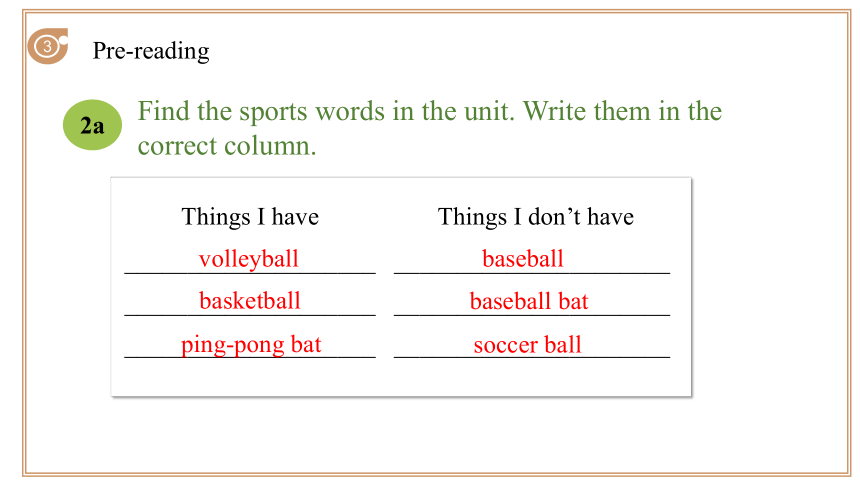
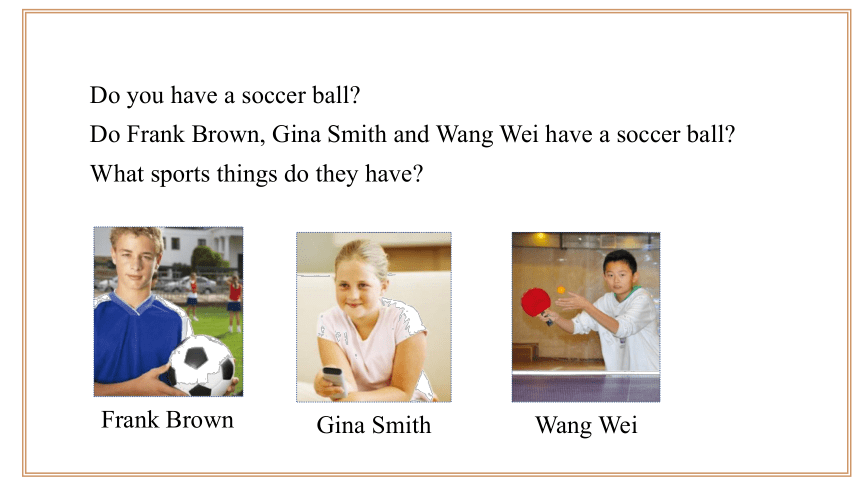
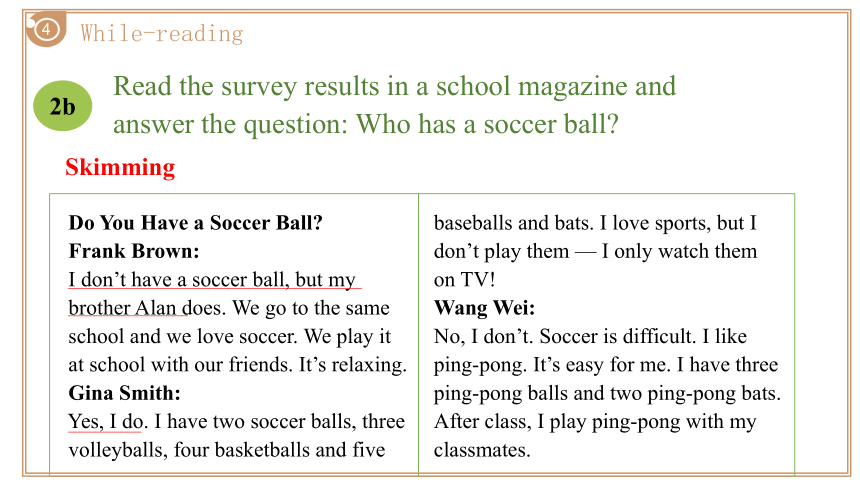
文档简介
(共31张PPT)
Section B 2a-2c
英语(人教版七上)
English
Unit 5
Do you have soccer ball
Lead-in
1
Learning objectives
2
Pre-reading
3
While-reading
4
Content
Post-reading
5
Language points
6
Summary
7
Exercise
8
能灵活阅读有关体育用品收藏的小短文,并能获得相关信息。
能帮助学生掌握一些阅读技巧:抓关键词、同义词和同义句转换等。
通过阅读有关运动的文章和对话, 使学生更加热爱体育活动并培养一种适合自己的体育爱好。
文化意识
语言能力
思维品质
学习能力
学生调查本班同学的体育物品,从而增强学生的口语表达能力和人际交往能力。
1
Objectives
Quick eyes
What’s this in English
Lead-in
2
Free talk
Do you like sports What sports things do you have
单词展示
adj.相同的
same
v.& n.爱;喜爱
love
prep.和……在一起;带有;使用
with
新课单词展示
n.体育运动
sport
pron.(they的宾格)他(她、它)们
them
adv.只;仅
only
v.喜欢;喜爱
like
adj.容易的;不费力的
easy
prep.& conj.在……以后
after
n.班级;课
class
n.同班同学
classmate
2a
Find the sports words in the unit. Write them in the correct column.
Things I have Things I don’t have
____________________ ______________________
____________________ ______________________
____________________ ______________________
volleyball
basketball
ping-pong bat
baseball
baseball bat
soccer ball
Pre-reading
3
Do you have a soccer ball
Do Frank Brown, Gina Smith and Wang Wei have a soccer ball
What sports things do they have
Frank Brown
Gina Smith
Wang Wei
Do You Have a Soccer Ball
Frank Brown:
I don’t have a soccer ball, but my
brother Alan does. We go to the same
school and we love soccer. We play it
at school with our friends. It’s relaxing.
Gina Smith:
Yes, I do. I have two soccer balls, three
volleyballs, four basketballs and five
baseballs and bats. I love sports, but I
don’t play them — I only watch them
on TV!
Wang Wei:
No, I don’t. Soccer is difficult. I like
ping-pong. It’s easy for me. I have three
ping-pong balls and two ping-pong bats.
After class, I play ping-pong with my
classmates.
2b
Read the survey results in a school magazine and answer the question: Who has a soccer ball
Skimming
______________________________________________________________
___________
While-reading
4
Do You Have a Soccer Ball
Frank Brown:
I don’t have a soccer ball, but my
brother Alan does. We go to the same
school and we love soccer. We play it
at school with our friends. It’s relaxing.
Gina Smith:
Yes, I do. I have two soccer balls, three
volleyballs, four basketballs and five
baseballs and bats. I love sports, but I
don’t play them — I only watch them
on TV!
Wang Wei:
No, I don’t. Soccer is difficult. I like
ping-pong. It’s easy for me. I have three
ping-pong balls and two ping-pong bats.
After class, I play ping-pong with my
classmates.
______________________________________________________________
___________
______________
—Who has a soccer ball
—Alan and Gina Smith.
Read the survey results again and answer the questions.
Scanning
1. Where do Frank and his brother play soccer
____________________________________
2. How many soccer balls does Gina have
____________________________________
3. What sport does Wang Wei like
____________________________________
At school./They play soccer at school.
Two./She has two soccer balls.
Ping-pong./He likes ping-pong.
1. I play ping-pong with my classmates after class.
2. I have soccer balls, basketballs, volleyballs and baseballs.
3. My brother has a soccer ball but I don’t.
4. I only watch sports on TV.
5. Soccer is not easy for me.
6. My brother and I are in the same school.
2c
Who do you think says these sentences Check (√) F for Frank, G for Gina or W for Wang Wei.
F G
W
√
√
√
√
√
√
Post-reading
5
Frank and Alan go to the same school.
2. Frank thinks playing soccer is boring.
3. Gina has many sports things.
4. Gina often plays sports.
5. Wang Wei has a soccer ball.
6. Wang Wei likes ping-pong.
Mark True (T) or false (F).
T
F
T
F
F
T
Read again
Do You Have a Soccer Ball
Frank Brown:
I don’t have a soccer ball, but my
brother Alan does. We go to the same
school and we love soccer. We play it
at school with our friends. It’s relaxing.
Gina Smith:
Yes, I do. I have two soccer balls, three
volleyballs, four basketballs and five
baseballs and bats. I love sports, but I
don’t play them — I only watch them
on TV!
Wang Wei:
No, I don’t. Soccer is difficult. I like
ping-pong. It’s easy for me. I have three
ping-pong balls and two ping-pong bats.
After class, I play ping-pong with my
classmates.
Listen and follow.
相同的
在电视上
这对我来说挺容易的
It’s+形容词+for sb. 它对某人来说是……的
班级; 课
同班同学
Language points
1. I don’t have a soccer ball, but my brother Alan does. (教材P29 2b)
but后的句子是一个省略句,为避免重复,此处用does代替了“has a soccer ball”,其完整表达是“but my brother Alan has a soccer ball”。
在并列句中,当前一分句的谓语动词为实义动词,且后一分句中作谓语的实义动词与前一分句中的相同时,可省略与前一分句中相同的成分,用助动词do或does代替。
do/does代替句中动词的用法
He doesn’t like apples, but I do. 他不喜欢苹果,但是我喜欢。
2. We go to the same school and we love soccer. (教材P29 2b)
same作形容词通常与定冠词the连用,位于单数名词前作定语。常构成短语:the same... as... 意为“与……相同的……”。
same adj. 相同的
We like the same color. 我们喜欢同一种颜色。
拓展延伸:same的反义词为different(不同的),后接名词时用复数形式。常构成短语:be different from... 意为“与……不同”。
My sister and I are in different schools. 我和我妹妹在不同的学校。
Lily has the same schoolbag as mine. 莉莉有一个和我一样的书包。
My pen is different from his. 我的钢笔与他的不同。
1) love在句中作动词,意为“爱; 喜爱”,近义词为like,但love感彩比like更强烈。后接名词、代词、动词-ing或动词不定式作宾语。
love v. & n. 爱; 喜爱
I love my family very much. 我很爱我的家人。
2) love还可用作名词,意为“爱; 喜爱”。
He loves playing ping-pong. 他喜欢打乒乓球。
He loves to read books after lunch. 他喜欢午饭后看书。
My parents give me much love and I love them.
我的父母给了我很多爱, 我爱他们。
3. We play it at school with our friends. (教材P29 2b)
at school意为“在学校”,相当于in school。
at school 在学校
with prep. 和……在一起;带有; 使用
1) 介词“和……在一起”
2) 介词“带有”
3) 介词“使用”
I live with my parents. 我和我的父母住在一起。
He is a boy with black hair. 他是一个黑头发的男孩。
We can see with our eyes. 我们可以用眼睛看。
4. I love sports, but I don’t play them — I only watch them on TV!
(教材P29 2b)
sport在此用作可数名词,当它作定语修饰名词时,常用其复数形式。
sport n.体育运动
Do you often do/play sports on weekends 你周末经常做运动吗?
them pron.( they的宾格) 他(她、它)们
them是人称代词they(他/她/它们 )的宾格形式。
Mr. Li teaches them English. 李老师教他们英语。
sports meeting 运动会 sports club 体育俱乐部
play sports和do sports都表示“做运动; 参加体育运动”。
I love sports, but I don’t play them—I only watch them on TV!
我喜欢运动,但我不玩——我只在电视上看!
on 介词,在此意为“通过”,表示做事情的方式和手段。
常用于:
on TV通过电视/从电视;
on the radio通过收音机/无线电;
on the phone通过电话;
on the Internet通过互联网。
e.g. I often study on the Internet.
4. I love sports, but I don’t play them — I only watch them on TV!
(教材P29 2b)
only作副词通常位于所强调的词、短语或句子前面。
only adv. 只;仅
Jim is only three years old. 吉姆只有三岁。
Only she has one dictionary. 只有她有一本字典。
She has only one dictionary。她只有一本词典。
特别提醒:only在句中位置不同,表达的含义也有所不同。
5. After class, I play ping-pong with my classmates. (教材P29 2b)
1) after在此处作介词,其后可接名词、代词、动词-ing形式。其反义词为before“在……之前” 。
We usually go for a walk after dinner. 晚饭后我们通常去散步。
after prep. & conj. 在……以后
2) after还可作连词,后接句子。
I do my homework after I get home every day. 我每天到家后做家庭作业。
1.We have read an article about “Do you have a soccer Ball ”
2. We have learnt “general questions” used in an article.
3.We have learnt some new words involving the passage.
Summary
7
1. I like to play computer games my cousin.
A. on B. with C. in D. under
2. He baseball.
A. don’t play B. doesn’t plays
C. doesn’t play D. not play
一. 单项选择。
B
C
Exercise
8
3. My mother loves volleyball. She thinks (认 为) it is .
A. fun B. boring C. difficult D. nice
4. I a baseball, my brother does.
A. don’t have; and B. don’t have; but
C. have; but D. doesn’t have; but
5. The girl is a Chinese (中国人) . Ping-pong is easy her.
A. with B. on C. of D. for
A
B
D
随堂练习
1.That sounds _______( ).
2.I _______(喜爱) sports.
3.I _______( ) have one friend in this class.
4.We have the _______( ) English teacher,Mr. Lee.
5.Do you _______(喜欢) playing computer games
二.根据句意及汉语提示填写单词。
easy
love
only
same
like
容易的
只
相同的
6.They're my brother's __________( ).
7.She is always late for ______(课 ).
classmates
class
同班同学
1.我没有足球,但是我哥哥有。
I don’t have a soccer ball, my brother .
2.莉莉在学校经常打网球。
Lily often plays tennis .
3.我哥哥经常在电视上看足球比赛。
My brother often soccer games .
4.他们放学后经常打篮球。
They often .
5.我和我哥哥在同一所学校。
My brother and I are .
三、完成句子,每空一词。
but does
at/in school
watches on TV
play basketball after school
in the same school
全力以赴 绽放未来
谢
谢
Go All Out, Bloom the Future
Section B 2a-2c
英语(人教版七上)
English
Unit 5
Do you have soccer ball
Lead-in
1
Learning objectives
2
Pre-reading
3
While-reading
4
Content
Post-reading
5
Language points
6
Summary
7
Exercise
8
能灵活阅读有关体育用品收藏的小短文,并能获得相关信息。
能帮助学生掌握一些阅读技巧:抓关键词、同义词和同义句转换等。
通过阅读有关运动的文章和对话, 使学生更加热爱体育活动并培养一种适合自己的体育爱好。
文化意识
语言能力
思维品质
学习能力
学生调查本班同学的体育物品,从而增强学生的口语表达能力和人际交往能力。
1
Objectives
Quick eyes
What’s this in English
Lead-in
2
Free talk
Do you like sports What sports things do you have
单词展示
adj.相同的
same
v.& n.爱;喜爱
love
prep.和……在一起;带有;使用
with
新课单词展示
n.体育运动
sport
pron.(they的宾格)他(她、它)们
them
adv.只;仅
only
v.喜欢;喜爱
like
adj.容易的;不费力的
easy
prep.& conj.在……以后
after
n.班级;课
class
n.同班同学
classmate
2a
Find the sports words in the unit. Write them in the correct column.
Things I have Things I don’t have
____________________ ______________________
____________________ ______________________
____________________ ______________________
volleyball
basketball
ping-pong bat
baseball
baseball bat
soccer ball
Pre-reading
3
Do you have a soccer ball
Do Frank Brown, Gina Smith and Wang Wei have a soccer ball
What sports things do they have
Frank Brown
Gina Smith
Wang Wei
Do You Have a Soccer Ball
Frank Brown:
I don’t have a soccer ball, but my
brother Alan does. We go to the same
school and we love soccer. We play it
at school with our friends. It’s relaxing.
Gina Smith:
Yes, I do. I have two soccer balls, three
volleyballs, four basketballs and five
baseballs and bats. I love sports, but I
don’t play them — I only watch them
on TV!
Wang Wei:
No, I don’t. Soccer is difficult. I like
ping-pong. It’s easy for me. I have three
ping-pong balls and two ping-pong bats.
After class, I play ping-pong with my
classmates.
2b
Read the survey results in a school magazine and answer the question: Who has a soccer ball
Skimming
______________________________________________________________
___________
While-reading
4
Do You Have a Soccer Ball
Frank Brown:
I don’t have a soccer ball, but my
brother Alan does. We go to the same
school and we love soccer. We play it
at school with our friends. It’s relaxing.
Gina Smith:
Yes, I do. I have two soccer balls, three
volleyballs, four basketballs and five
baseballs and bats. I love sports, but I
don’t play them — I only watch them
on TV!
Wang Wei:
No, I don’t. Soccer is difficult. I like
ping-pong. It’s easy for me. I have three
ping-pong balls and two ping-pong bats.
After class, I play ping-pong with my
classmates.
______________________________________________________________
___________
______________
—Who has a soccer ball
—Alan and Gina Smith.
Read the survey results again and answer the questions.
Scanning
1. Where do Frank and his brother play soccer
____________________________________
2. How many soccer balls does Gina have
____________________________________
3. What sport does Wang Wei like
____________________________________
At school./They play soccer at school.
Two./She has two soccer balls.
Ping-pong./He likes ping-pong.
1. I play ping-pong with my classmates after class.
2. I have soccer balls, basketballs, volleyballs and baseballs.
3. My brother has a soccer ball but I don’t.
4. I only watch sports on TV.
5. Soccer is not easy for me.
6. My brother and I are in the same school.
2c
Who do you think says these sentences Check (√) F for Frank, G for Gina or W for Wang Wei.
F G
W
√
√
√
√
√
√
Post-reading
5
Frank and Alan go to the same school.
2. Frank thinks playing soccer is boring.
3. Gina has many sports things.
4. Gina often plays sports.
5. Wang Wei has a soccer ball.
6. Wang Wei likes ping-pong.
Mark True (T) or false (F).
T
F
T
F
F
T
Read again
Do You Have a Soccer Ball
Frank Brown:
I don’t have a soccer ball, but my
brother Alan does. We go to the same
school and we love soccer. We play it
at school with our friends. It’s relaxing.
Gina Smith:
Yes, I do. I have two soccer balls, three
volleyballs, four basketballs and five
baseballs and bats. I love sports, but I
don’t play them — I only watch them
on TV!
Wang Wei:
No, I don’t. Soccer is difficult. I like
ping-pong. It’s easy for me. I have three
ping-pong balls and two ping-pong bats.
After class, I play ping-pong with my
classmates.
Listen and follow.
相同的
在电视上
这对我来说挺容易的
It’s+形容词+for sb. 它对某人来说是……的
班级; 课
同班同学
Language points
1. I don’t have a soccer ball, but my brother Alan does. (教材P29 2b)
but后的句子是一个省略句,为避免重复,此处用does代替了“has a soccer ball”,其完整表达是“but my brother Alan has a soccer ball”。
在并列句中,当前一分句的谓语动词为实义动词,且后一分句中作谓语的实义动词与前一分句中的相同时,可省略与前一分句中相同的成分,用助动词do或does代替。
do/does代替句中动词的用法
He doesn’t like apples, but I do. 他不喜欢苹果,但是我喜欢。
2. We go to the same school and we love soccer. (教材P29 2b)
same作形容词通常与定冠词the连用,位于单数名词前作定语。常构成短语:the same... as... 意为“与……相同的……”。
same adj. 相同的
We like the same color. 我们喜欢同一种颜色。
拓展延伸:same的反义词为different(不同的),后接名词时用复数形式。常构成短语:be different from... 意为“与……不同”。
My sister and I are in different schools. 我和我妹妹在不同的学校。
Lily has the same schoolbag as mine. 莉莉有一个和我一样的书包。
My pen is different from his. 我的钢笔与他的不同。
1) love在句中作动词,意为“爱; 喜爱”,近义词为like,但love感彩比like更强烈。后接名词、代词、动词-ing或动词不定式作宾语。
love v. & n. 爱; 喜爱
I love my family very much. 我很爱我的家人。
2) love还可用作名词,意为“爱; 喜爱”。
He loves playing ping-pong. 他喜欢打乒乓球。
He loves to read books after lunch. 他喜欢午饭后看书。
My parents give me much love and I love them.
我的父母给了我很多爱, 我爱他们。
3. We play it at school with our friends. (教材P29 2b)
at school意为“在学校”,相当于in school。
at school 在学校
with prep. 和……在一起;带有; 使用
1) 介词“和……在一起”
2) 介词“带有”
3) 介词“使用”
I live with my parents. 我和我的父母住在一起。
He is a boy with black hair. 他是一个黑头发的男孩。
We can see with our eyes. 我们可以用眼睛看。
4. I love sports, but I don’t play them — I only watch them on TV!
(教材P29 2b)
sport在此用作可数名词,当它作定语修饰名词时,常用其复数形式。
sport n.体育运动
Do you often do/play sports on weekends 你周末经常做运动吗?
them pron.( they的宾格) 他(她、它)们
them是人称代词they(他/她/它们 )的宾格形式。
Mr. Li teaches them English. 李老师教他们英语。
sports meeting 运动会 sports club 体育俱乐部
play sports和do sports都表示“做运动; 参加体育运动”。
I love sports, but I don’t play them—I only watch them on TV!
我喜欢运动,但我不玩——我只在电视上看!
on 介词,在此意为“通过”,表示做事情的方式和手段。
常用于:
on TV通过电视/从电视;
on the radio通过收音机/无线电;
on the phone通过电话;
on the Internet通过互联网。
e.g. I often study on the Internet.
4. I love sports, but I don’t play them — I only watch them on TV!
(教材P29 2b)
only作副词通常位于所强调的词、短语或句子前面。
only adv. 只;仅
Jim is only three years old. 吉姆只有三岁。
Only she has one dictionary. 只有她有一本字典。
She has only one dictionary。她只有一本词典。
特别提醒:only在句中位置不同,表达的含义也有所不同。
5. After class, I play ping-pong with my classmates. (教材P29 2b)
1) after在此处作介词,其后可接名词、代词、动词-ing形式。其反义词为before“在……之前” 。
We usually go for a walk after dinner. 晚饭后我们通常去散步。
after prep. & conj. 在……以后
2) after还可作连词,后接句子。
I do my homework after I get home every day. 我每天到家后做家庭作业。
1.We have read an article about “Do you have a soccer Ball ”
2. We have learnt “general questions” used in an article.
3.We have learnt some new words involving the passage.
Summary
7
1. I like to play computer games my cousin.
A. on B. with C. in D. under
2. He baseball.
A. don’t play B. doesn’t plays
C. doesn’t play D. not play
一. 单项选择。
B
C
Exercise
8
3. My mother loves volleyball. She thinks (认 为) it is .
A. fun B. boring C. difficult D. nice
4. I a baseball, my brother does.
A. don’t have; and B. don’t have; but
C. have; but D. doesn’t have; but
5. The girl is a Chinese (中国人) . Ping-pong is easy her.
A. with B. on C. of D. for
A
B
D
随堂练习
1.That sounds _______( ).
2.I _______(喜爱) sports.
3.I _______( ) have one friend in this class.
4.We have the _______( ) English teacher,Mr. Lee.
5.Do you _______(喜欢) playing computer games
二.根据句意及汉语提示填写单词。
easy
love
only
same
like
容易的
只
相同的
6.They're my brother's __________( ).
7.She is always late for ______(课 ).
classmates
class
同班同学
1.我没有足球,但是我哥哥有。
I don’t have a soccer ball, my brother .
2.莉莉在学校经常打网球。
Lily often plays tennis .
3.我哥哥经常在电视上看足球比赛。
My brother often soccer games .
4.他们放学后经常打篮球。
They often .
5.我和我哥哥在同一所学校。
My brother and I are .
三、完成句子,每空一词。
but does
at/in school
watches on TV
play basketball after school
in the same school
全力以赴 绽放未来
谢
谢
Go All Out, Bloom the Future
同课章节目录
- starters 预备篇(2012秋审查)
- Unit 1 Good morning !
- Unit 2 What’s this in English?
- Unit 3 What color is it ?
- Unit 1 My name's Gina.
- Section A
- Section B
- Unit 2 This is my sister.
- Section A
- Section B
- Unit 3 Is this your pencil?
- Section A
- Section B
- Unit 4 Where's my schoolbag?
- Section A
- Section B
- Unit 5 Do you have a soccer ball?
- Section A
- Section B
- Unit 6 Do you like bananas?
- Section A
- Section B
- Unit 7 How much are these socks?
- Section A
- Section B
- Unit 8 When is your birthday?
- Section A
- Section B
- Unit 9 My favorite subject is science.
- Section A
- Section B
